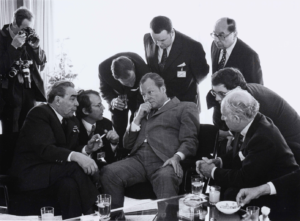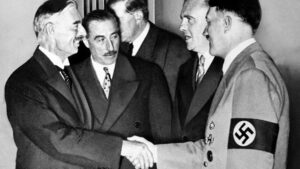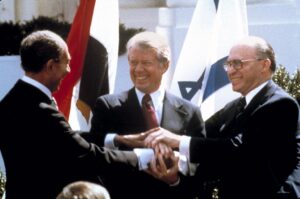When America Grows Tired of Being the World’s Punching Bag...
- 12 srpna, 2024

The United States is enemy number one in the eyes of freedom’s foes whether they hail from the far left, the far right, assorted dictatorships, or religious fanaticism. And in those hate-soaked cultures where that isn’t quite the case, the USA still lands a strong second in the league tables of irrational loathing, right after Israel, a country ringed by states where hardly anyone would choose to live voluntarily. By all appearances, the United States has learned to live with a world that works out its insecurities at America’s expense, but nothing lasts forever.
The first paradox that jumps out at me is that the allegedly “hated” United States remains the single most popular destination for migrants anywhere in the world each year, while practically no one is clamoring to move to the nations that bash America the loudest. And before you dig up a few genuine desperados who headed from the West to, say, Russia, remember: they were either exposed spies or people on the run from legal trouble. The second paradox is that Europe’s self-styled „intellectual and political elites“ often speak down to the U.S., deriding it as the world’s policeman and preaching that Europe must “emancipate” itself and prove it can get along without America. Yet the instant someone in U.S. politics suggests the country should concentrate on its own domestic problems first, a frightened squeal erupts: how dare those impudent Americans, even think of it? After all, without them Europe would face a security crisis. That contradiction Europe wanting American security guarantees funded by the U.S. taxpayer while simultaneously doing business with its biggest adversary is nothing new. Angela Merkel and her Russian Trojan horse called Nord Stream spring immediately to mind: under the banner of “green” policy it aimed to swap zero-emission nuclear plants for gas-fired ones burning Russian fuel. Lest we forget, supposedly rational German strategy has produced plenty of such useful idiots over the years; from recent history, Willy Brandt pops up off the top of my head.

Soviet leader Leonid Brezhnev and German Chancellor Willy Brandt
Willy Brandt served as chancellor of the Federal Republic of Germany (West Germany) from 1969 to 1974. True to his socialist leanings, he focused above all on cultivating good relations with the communist bloc, even though that bloc was then in the throes of its greatest territorial expansion and had just demonstrated its “peace-loving” nature to West Germans by invading Czechoslovakia a year before Brandt took office. Yes, living in peace with one’s neighbors is laudable, especially when you carry a certain burden of guilt, which both Germanies surely did a mere twenty-five years after World War II. Hearing the German chancellor occasionally apologize for Nazi atrocities was therefore welcome. What was decidedly not welcome, however, was Brandt’s eagerness to strike business deals with a communist dictatorship, deals that funneled fresh money and modern technology to the Soviet Union, which promptly used them to arm itself and pursue its goal of undermining the free world.
Under the Erdgasröhren project, best summed up as a “pipes-for-gas” swap, West Germany paid for construction of the Druzhba gas pipeline and, for the first time since the war, chained itself to dependence on Russia (then operating under the trade name “the Soviet Union”). Unsurprisingly, the United States, busy containing communist aggression around the globe and underwriting West Germany’s security, found the scheme unpalatable; National Security Adviser (and future Secretary of State) Henry Kissinger spoke of it in strikingly undiplomatic terms. Even so, President Richard Nixon let the deal proceed, and badly needed hard currency began flowing from Bonn to Moscow.
Fortunately, less than a year after the gas started flowing, it emerged that one of Brandt’s closest confidants, Günter Guillaume, his personal assistant and the architect of many of his political initiatives, was an East German secret-service spy. Brandt was suddenly unable to press ahead with some of his more curious ideas. Nevertheless, as so often happens with politicians whose fine words outshine their concrete deeds, he still received the Nobel Peace Prize.
Things played out much the same in June 2020, when President Donald Trump announced at a White House press conference that the United States planned to cut its troop presence in Germany from roughly 34,500 to 25,000 men and women. In a flash, every “progressive” politician and journalist forgot their long-standing worries about the American cop on the beat and began fretting over Trump’s alleged isolationism. Lost in the argument was the fact that Trump was reacting to Germany’s and several other European NATO members’, failure even to meet the alliance’s minimum spending commitments for collective defense. No one seemed eager to note that Germany was also leading the charge to accommodate an aggressive Russia, which by then had occupied part of Georgia for twelve years and had been waging an undeclared war against Ukraine for six. Europeans love to point to their advanced social-welfare systems and free, accessible health care far more generous than what most Americans enjoy but they seldom add that this is possible in part because the United States has underwritten their security for decades. One has to wonder how much longer Americans will be willing to foot the bill.
But defense isn’t the only field riddled with contradictions. Historically, the United States has also lived with lopsided tariff schedules on a long list of industrial goods. Right after World War II that imbalance made perfect sense: Washington wanted to jump-start Europe’s industrial recovery, including that of defeated Germany. The reasoning was straightforward: people who live comfortably at home have little appetite for dying in senseless wars. Everyone still had the ill-fated Treaty of Versailles in mind a settlement that, in several ways, empowered German politicians bent on staging a “round two” they intended to win. U.S. planners calculated that if America shared a slice of its wealth with Europe, American soldiers wouldn’t have to cross the Atlantic a third time to rescue a continent that had once again set itself ablaze.
Set aside the Marshall Plan, officially the European Recovery Program, which funneled the present-day equivalent of roughly $130 billion into Europe, mostly as grants. Another pillar of help was ultra-low tariffs. What was reasonable in the mid-1950s is far harder to defend today. Import a passenger car from the U.S. into Europe and you pay a 10 percent duty; motorcycles carry a 6–8 percent tariff on top of a punishing value-added tax that runs anywhere from 19 to 25 percent across the EU. Send the same goods the other direction and the duty is just 2.5 percent on cars, 0–2.4 percent on bikes, and the United States has no VAT at all. Yes, individual states levy sales taxes, but those range from zero to “as high as” 7 percent, hardly comparable to Europe’s 25 percent VAT. Again, one has to wonder: how much longer will Americans keep tolerating this?
A fascinating chapter in all this is the United Nations, that peculiar club where gentlemen wield the same clout as barbarians, and, let’s be honest, there are plenty of barbarians on the roster. In modern history the UN was the second attempt at a platform where dignified diplomats could wisely hammer out solutions to the world’s problems. The first try was the League of Nations, and it ended in tragedy: the barbarians of the day, Nazi Germany and its pals, the Soviet Union, Fascist Italy, and militarist Japan, first sabotaged its work and, once it no longer suited them, simply walked away. The League also failed in no small part because the United States never joined. After World War I, America alone had the economic and military muscle to play “world policeman,” but it wanted no part of the role and assumed Europe had learned enough from the Great War’s slaughter to avoid another. Europe being Europe, however, positively revels in creating problems and devising foolish fixes—such as sagely advising invaded nations that the best response to an aggressive neighbor is to surrender a slice of territory, after which eternal peace will surely follow. That was the counsel offered to Czechoslovakia at Munich in 1938, and to Ukraine at Minsk in 2014.

The Munich Agreement, the British and French Prime Ministers sacrificed Czechoslovakia to the Nazis
The United Nations is attempt number two – and to make sure some future American president couldn’t slip the leash quite so easily, its headquarters sits in New York City, while the United States pays the biggest share of the bills. All this even though, for reasons lost to history, a whole raft of countries – most of them loud haters of the West and of our endless quest for “consensus” – contribute nothing at all.
The funding of various UN agencies is even more absurd. Take UNRWA, for starters: the only UN body devoted to a single ethnic group – “Palestinian refugees” – and it has been so nonstop since 1948. Without downplaying the suffering of Palestinians – some of whom were indeed driven out of parts of today’s Israel seventy-six years ago, while others left voluntarily believing that invading Arab armies would wipe out the Jews and let them reclaim the land – it is genuinely hard to grasp why no one else has ever received the same treatment. And we’ve had plenty of other displaced peoples since World War II: Germans expelled from Poland, Czechoslovakia, the Netherlands, France; Jews robbed and hounded out of Arab countries after Israel’s birth; millions of Africans still chased from states Europeans drew with a ruler in Berlin; more recently Kurds and Yazidis in the Middle East or white farmers murdered and driven from ancestral lands in what used to be Rhodesia or in today’s South Africa.
Yet UNRWA, which cares for five million registered Palestinians, enjoys an annual budget of $1.5 billion – funded chiefly by the United States. By contrast, UNHCR, the UN agency responsible for all 110 million non-Palestinian refugees worldwide, operates on an average budget of about $10 billion – again largely bankrolled by Washington. A little head-math shows that, per capita, someone claiming Palestinian identity is entitled to three times the UN support of any other refugee on Earth. There is no legitimate reason for that.
Palestinians, after all, are an Arab problem, not an American one; the region is full of wealthy states running budget surpluses, unlike the United States. But those states don’t send money to pay for schools, clinics, or food aid – when they do send cash, it’s mostly for weapons. Why bother with education or medical care when the “dumb” Americans and Europeans pick up the tab? And just how grateful are the Palestinians for that generosity? They showed us on 9/11, celebrating the terrorist attacks on the United States, and again after October 7, when Hamas slaughtered Israelis and still holds even American citizens hostage.
Which brings us back to the core question: Why are Americans also the largest contributors to UNHCR? Much of that money ends up in Africa – whose resources are exploited by China and, increasingly, by Russia and Turkey. Meanwhile, the United States faces staggering costs dealing with people who cross its own borders illegally. And so, we arrive, yet again, at the fundamental question: How much longer will Americans keep putting up with this?
Another glaring paradox is the U.S. military and economic aid that flows right next door to the Palestinian territories – to Egypt. Washington ships Cairo a tidy $1.5 billion every single year, money that simply adds to America’s national debt. The arrangement is a vestige of the Camp David peace accords: to keep Egypt from going to war with Israel again, the United States began supplying it with American weapons systems. What’s baffling is that the aid keeps rolling even as Egypt buys weaponry from America’s global rivals paying full commercial prices, not getting hand-outs and still refuses to use the U.S.-supplied arms against Iran-backed terrorists who are wrecking Egypt’s own economy. Cairo leaves that fight to Washington. Once more the question looms: how much longer will Americans put up with this?

The 1978 Camp David Accords, Anwar Sadat, Jimmy Carter and Menachem Begin
I love America, though I probably liked Ronald Reagan’s America better than Joe Biden’s, but it’s still one of the few places on earth where people go to build a better life, including VIPs from regimes that publicly hate the United States, Russia being a prime example. “Birth tourism,” where pregnant Russians fly to the U.S. so their babies can be born American citizens, hasn’t slowed down even after Moscow launched its current war.
America is the lone country that guarantees the security of every EU nation, Japan, South Korea, Israel to a degree, and a host of smaller states most Europeans would have to hunt for on a map. That doesn’t mean Washington never blunders; it does. I still take issue with the second Gulf War, the ill-conceived effort to implant our brand of democracy in Afghanistan, and the backing of the Arab Spring that shattered the Middle East. Yet it’s only fair to admit that the Arab Spring was chiefly egged on by Europe, and America tagged along so the Continent having overestimated its own clout yet again, wouldn’t lose face.
It’s equally fair to note that far more instability comes from Russia, Turkey, North Korea, or the ham-handed post-colonial policies of Britain and France. I wish our politicians showed more empathy for American anxieties and for what weighs on ordinary Americans. Paying everyone’s bills while serving as the world’s punching bag won’t amuse them forever. And when the U.S. finally tires of it, we already have historical precedents for what happens to the UN, to NATO, and ultimately to Europe, and none of them ended well.
©2024 Milan Mikulecký. Všechna práva jsou vyhrazena.